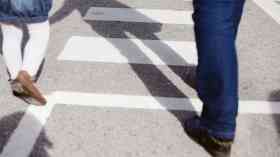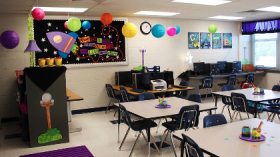A case study of effective practice in sport
 One of the leading programmes that the Youth Sport Trust work on to help ensure the prominence of PE and school sport is Sky Sports Living for Sport, which is part of Sky Academy.
One of the leading programmes that the Youth Sport Trust work on to help ensure the prominence of PE and school sport is Sky Sports Living for Sport, which is part of Sky Academy.
The free initiative was launched by Sky Sports back in 2003 in partnership with the Youth Sport Trust and has since gone from strength to strength. In essence, the aim of Sky Sports Living for Sport is to use sport stars and sport skills to improve young people’s lives.
This initiative for 11-16 year olds is available to all secondary schools in the UK and Ireland. The programme is designed to inspire and support every participant in areas relevant to them whether it’s improving confidence, attainment at school or leading a healthier lifestyle.
A significant factor
Rastrick High School in Calderdale, West Yorkshire, has approximately 1400 students on its books with 40 per cent of those black or ethnic minority and 12 per cent currently on the Free School Meals programme. The school was rated ‘good’ in its Ofsted inspection in January this year.
Rastrick is situated between two council estates, and with recurring conflict between the two estates, there is a historical issue with low boys attainment. However, attainment is good with 74 per cent GCSE including english and maths and about 80 per cent achieving expected progress in 2014.
The first cohort of the Sky Sports Living For Sport programme went through in 2014 and the school says the Sky Sports Living For Sport work was a significant factor in their good results that year.
Under achievers
The project targeted students who were underachieving in their English studies. This included a mix of low, middle and high attainers, intended to support each other. The programme assists the slide before students begin the study of GCSE topics.
The school indicated that boys were a key target, so the programme identified underachieving boys who regularly engaged or enjoyed PE – not necessarily those who were good at it – so that the context would be a successful engager. Out of the 50 students that this applied to, further subdivision was initiated into those boys with an additional known barrier, such as attendance levels or self esteem. The final cohort totalled 20 students, very diverse in their needs and issues.
The project primarily aims to improve attendance and behaviour but also addresses self esteem and targets an improvement in literacy levels, as this is seen as fundamental to achieving in all subjects. The programme encourages students to develop leadership skills in order to improve social and communication skills. This allows students to have the confidence and ability to speak clearly and correctly.
The first year
Each year a ‘project’ is developed by the Sky Sports Living For Sport team. This project has a sport theme but requires skills and knowledge from a range of other subjects. It is run approximately from the October half term to Easter.
The school do a small amount of Aussie Rules Football in year 7 and so asked the Sky Sports Living For Sport group to produce a booklet introducing the year 7 students to the sport and to support them in delivering lessons.
It was key to pick a sport that was not familiar to any of them so that the group started at the same baseline of knowledge and skill with the sport. This created a supportive and effective team environment for the boys.
The english department were focusing on ‘writing for purpose’ at the same time so there was alignment with the work. Students gained research through holding conversations with other members of the PE department, and through strategically placed books and websites, which complimented our school’s literacy focuses of speaking, listening and reading. More able students were able to infer ideas from their research and responses of greater depth, showing greater understanding, which they then explained to the weaker members of the group. Weaker members of the group then had to teach me, as it was my first year in the school and because I had never taught Aussie Rules before, I didn’t know anything about it.
Students created their own list of punishments for when they used the wrong words, or if they failed to use proper English. Punishments ranged from press ups and star jumps to running a lap of the pitch. It was very light-hearted and the students loved listening out for poor grammar from the rest of the group and especially myself.
A key part of the skill development strategy was the ‘changing room challenges’ where tasks were set to develop their associated skills in the time it took to get changed. A league table was displayed on the wall of performance in these challenges. The competitive element was very successful within the group. The booklets were judged by the year 7 and were key in improving literacy skills.
The delivery of taster sessions by the young people was key in improving language, leadership, self-respect, behaviour and an appreciation of the role of teacher which anecdotally led to improved relationships across the school.
Subsequent years and developments
The second year project had a focus on poetry, whilst this year the project involves literacy and mathematics. They are designing a football stadium to a budget, and will have to write a persuasive letter to the chairman (head teacher!) explaining why he should choose their design.
Each student has a mini-contract which means that if they have any behaviour incidents across the school they will be suspended and then expelled from the project. Similarly actions are undertaken if attendance rate falls.
English teachers lead skill sessions about english but get involved in the practical. Additionally, PE teachers lead practical work but get involved in the other elements of the programme. In the first year the english teachers went through the motions a bit but after seeing the impact it has, are now heavily driving the development.
Over time the project has extended the time for the sessions (now one or two hours) which has meant the english and maths input can be done more seriously. Sessions, delivered by specialists, now tend to have a practical and a theory component.
A thorough and critical review takes place each year at the end of the project which has meant each year the project has developed significantly.
What was the impact on participants?
Over the three years the impacts have developed. In the first year the impact was seen on behaviour and attendance only. Despite significant impact on these key issues, staff were disappointed not to see a measurable impact on literacy levels. They changed elements to increase impact on these skills in subsequent years and in the 2015 programme over 50 per cent or participants are already exceeding their literacy targets for the academic year.
However, staff have also learnt that actually the most important improvement is in the behaviour and attendance because it is the re-engagement with school that has the most sustainable effect on learning and attainment. They are clear that it is the focus on these things that needs to be the priority.
The impact on behaviour and attendance has been hugely significant. In the second year 100 per cent improved attendance, 88 per cent increased English scores, 75 per cent reduced the number of behaviour incidents logged against them and 70 per cent improved their ‘attitude to learning’ just over the course of the project.
School based stats echoed by the students who feel like the project has had a real impact on their attitudes and behaviours around school. A combination of the inspirational visits by the athlete mentors and the large amounts of work the students have done on literacy has helped the students to have more confidence and belief in their abilities, resulting in over two thirds of the group now considering further education after school.
School wide impact
The schools 2014 GCSE results included the first batch from Sky Sports Living For Sport. The results are believed to be significantly affected by the initiative as these were the most underperforming group from the year group. At the time, these boys not only pulled down the cohort’s results but were likely to have impact on their peer results by association.
As of March 2015, the Sky Sports Living For Sport group has the greatest progress of any cohort in the school.
One boy in particular was painfully shy due to very low self esteem. He didn’t get involved in anything and wouldn’t ask for help so tended to underachieve at a Level 4 and quietly fail. The poem he produced was marked at a Level 6a by the english department. He is now unrecognisable and actually led a session to Key Stage 3 pupils during a whole school leadership day a couple of months ago.
Another young lad had experienced his parents split up. His father disowned him and, when linked to the older brother who was quite clever, was regularly told him he was a ‘waste of oxygen’. This label became a self-fulfilling prophecy and he believed he was unworthy. His progress and behaviour was poor, and he was on a ‘headteacher warning’ which basically meant he was close to permanent exclusion.
He was included in the Sky Sports Living for Sport programme despite a number of staff saying it wasn’t worth it. He has become a remarkably different pupil. He is now expected to get five C grades, from 18 months ago when he was not expected to get five passes. Now he comes back to the project and supports the current group.
Although the project hasn’t impacted directly on curriculum provision, there is anecdotal evidence that it has impacted on the pedagogy of the english and maths teachers who have had the chance to observe PE lessons more than they would have previously had. It has developed trust and positive relationships with PE staff which has resulted in them trying approaches not used previously.
A ‘Be The Best’ programme delivered in year 9 last year was rolled out across the whole year group to improve self-esteem and confidence. Although the context was not sport, it was influenced heavily by the Sky Sports Living For Sport approaches and the learning that staff had experienced through it. It encouraged students to get out of their comfort zones and try new activities across a range of subjects including sport, languages, science and geography and used athlete and other subject role models.
The experience of this work has also influenced thinking about how the school groups students and identifies teachers. It traditionally operates ‘sets’ in english, maths and science and at the time of writing is considering the use of the PE/maths and PE/English teachers to create different groups where ‘teachability’ is maximised by potentially creating a ‘sporty’ group that may perform better using approaches linked to PE.
The project has had such a significant impact that two teachers have been appointed this year teaching joint PE/English and joint PE/Maths respectively.
Sustainability
The project is a high priority in the school. The head teacher regularly pops in and the chair of Governors is aware and asks for progress updates. Using ‘catch up’ funding to support delivery puts it at the heart of school improvement plans as well as giving additional resource for the work.
The english and maths departments have seen the impact on the attainment for these young people who are often hard to reach through traditional English or Maths interventions and therefore value the project as a key driver to their success. This means they prioritise the project and contribute with conviction.
Each year, as described above, the project evolves, the delivery of teaching improves and the impacts have become greater. The school is exploring how the principles can be used in other programmes and for a greater number of young people, possibly using the joint PE and english/maths teachers.
Further information
www.youthsporttrust.org
Latest News
12/12/2025 - 11:39
The government has announced at least £3 billion to create tens of thousands of new speci
12/12/2025 - 07:07
The findings suggest that children and young people attending schools in the North of England are less likely to take part in and benefit from residential visits.
11/12/2025 - 13:52
Ofqual has launched a 12-week public consultation on its proposed approach to regulating on-screen exams in GCSEs, AS and A levels.
11/12/2025 - 09:49
A report by Ofsted and the Care Quality Commission (CQC) finds that support for children with special educational needs and/or disabilities (SEND) who do not attend school full-time is too inconsistent.
11/12/2025 - 09:37
The easy-to-use web-based tool is designed to help schools estimate how an air filter unit could impact air quality and energy consumption in a classroom.







